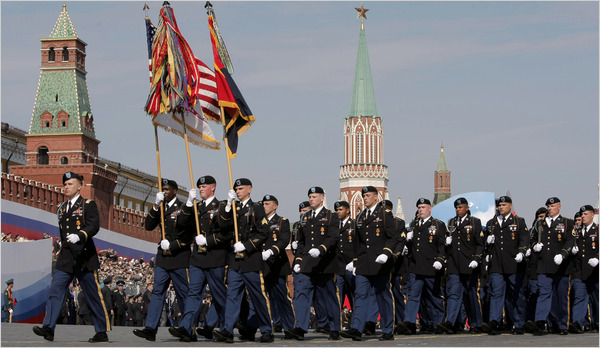Since the end of the Cold War, Russia has been something of a mystery to the West. Two competing instincts, incorporating Russia into international institutions and “finishing the job” of marginalizing Moscow, have never coexisted peacefully. As a result, Western relations with Moscow have steadily declined over the last fifteen years. Leaders in the West are now asking: what comes next?
I was in Moscow last week, participating in a trilateral dialogue about the future of US-Europe-Russia relations. While many participants were optimistic about a shared future with Russia, I am more skeptical.
After the USSR collapsed, NATO faced a critical choice. Rather than immediately include Russia as a full member and sponsor their membership to the World Trade Organization, NATO chose instead to declare Russia ill prepared” for either organization.
It was a curious decision, given the early admissions into the WTO of Kyrgyzstan in 1996, and into NATO of Poland and Hungary in 1999. None of these countries were more “functional” or developed than Russia, but they were included into Western institutions early on. Russia was never given that opportunity. As the 1990s progressed the country literally fell apart; the economy was stolen by gangsters and collapsed. The military crumbled to pieces and Russia’s influence and prestige declined.
When Vladimir Putin came onto the scene in 2000, he promised to rebuild Russia’s power and influence. He did not make Russia an open, liberal country—and he never really promised to. He did, however, restore Russia’s economy, rebuild the military, and make Russia an important country again—and a juggernaut in the energy sector.
Putin also seems to have decided Russia’s fate is not with the West. He has built a successful and profitable economic relationship with Europe, trading oil and gas for Europe’s manufactured goods. But politically, they remain at loggerheads; Russia plays games with gas supplies and eastern countries remain terrified of too much Russian influence over their policies. The 2008 war in Georgia only reinforced these fears.
The United States does not need Russian energy, and while a normalized trade relationship with Moscow is important, US trade with Russia is about one tenth that with Europe. So while Europe certainly needs Russia, and to a degree Russia needs Europe, neither geography nor economics suggest a Russia-US relationship.
America and Russia do not face each other through Europe anymore; Russian tanks are no longer poised to cross the Fulda Gap to invade Germany. The end of the Cold War also brought about the end of Europe linking America to Russia. Now, America and Russia face each other across the Northern Pacific. This is one of the ironies of President Obama’s “Pivot to Asia”—Russia is an Asian power, too.
But simple geography says nothing about shared interests, or norms, or even values. Ultimately both Moscow and Washington want to be prosperous and at peace. They both oppose terrorism, worry about managing narco-trafficking through their territory, and face difficult financial and economic choices. In the long run both will have to adjust their economies to avoid the petroleum curse.
There are some rather large issues over which Russia and the United States can and do to see eye-to-eye. But those are just interests—common causes where Moscow and Washington can agree on specific problem. In the larger scheme, there is no romance to the relationship, especially compared to the “special relationship” the US and UK share.
The trilateral dialogue asked: Can a new sense of Atlanticism bring romance to the Russia relationship? I don’t see it. National relationships are not transitive; a positive Russian-European relationship and a positive European-American relationship does not equal a positive Russian-American relationship. There has to be something beyond Europe that brings the two together.
Or does there? The idea of a functional, transactional relationship with Russia didn’t appeal to the attendees. Moscow and Washington work together on some issues, and they disagree on others. Frankly, that’s a tremendous improvement from where things were in 1991. But for some reason it’s not enough.
I’m not sure there is a way to resolve that. The United States and China have an enormously productive trade relationship. China voraciously consumes US money, and the United States voraciously consumes Chinese manufactured goods. But that trade relationship has not translated into “normal” relations. Beijing and Moscow do not agree on many things, and both countries still openly wonder if they’re going to go to war in the future over cyber issues, Taiwan, the Diaoyu islands, or something else.
No one realistically thinks the United States will go to war with Russia any time in the foreseeable future. Instead, Russia and America disagree on which side to back in the Syrian civil war, how to handle Georgia in the South Caucasus, and who gets access to resources in the Arctic. These are important issues, to be sure, but they do not point to a violent crisis in relations. Rather, they suggest a fairly normal set of differing interests managed, for the most part, through normal processes (bargaining and diplomacy).
I didn’t grow up in the Cold War. The Berlin Wall fell when I was 10 years old. The constant fussing over Russia seems strange to people my age. Maybe that’s what is important: Russia and America might not ever be friends, but they do work together on some important issues. When you think about where the relationship was in 1990, this is an astonishing achievement.
Joshua Foust is a DC-based analyst who writes about strategy, counterterrorism, and futures. His website is joshuafoust.com. This article originally appeared in PBS Need to Know.
Image: 10russia_CA0-articleLarge.jpg
